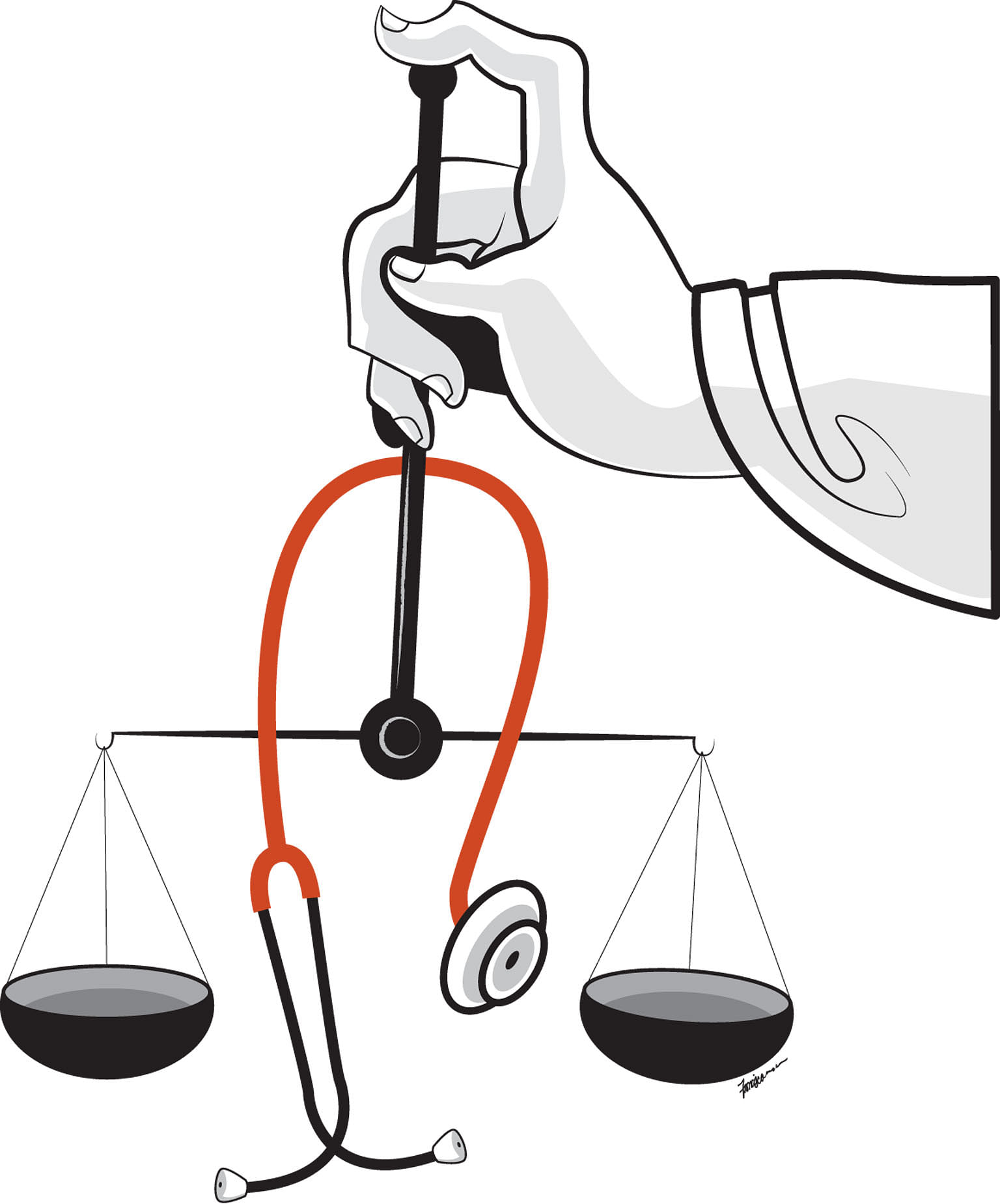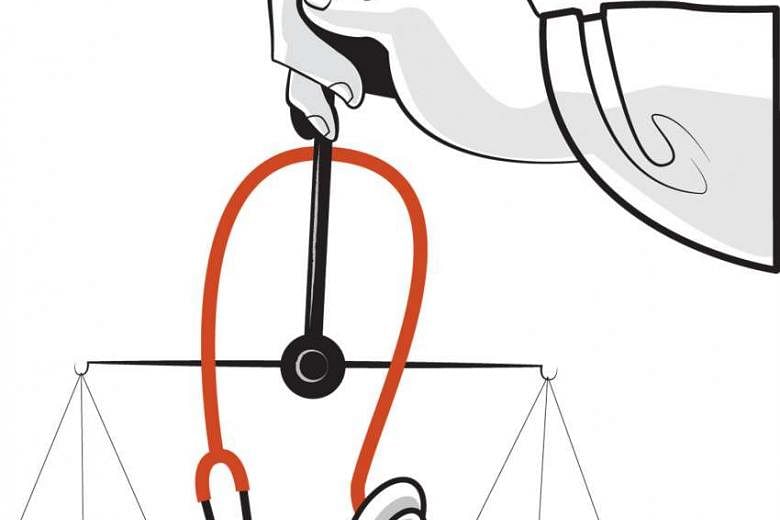Last month, a doctor was jailed for nine months for issuing death certificates without checking the real cause of death. He has also been suspended from practice for three years.
If not for a change in the Medical Registration Act that came into force in December 2010, and if the Singapore Medical Council (SMC) had not used its new powers, the doctor would have merely served a three-month suspension and paid half the cost of the disciplinary hearing.
The difference in the way the disciplinary committee and the Court of Appeal viewed the severity of the offence is stark.
This case has essentially opened up a new chapter in the accountability of the medical profession and the protection of patient welfare.
The amendment to the Act appears simple: it now allows the complainant to request the SMC to file an appeal against the findings and the decisions of the independent disciplinary tribunal (DT). The SMC can also initiate such an appeal on its own. Previously, only the doctor had the right of appeal.
The change also resulted in fines levied by a disciplinary tribunal to be paid solely by the doctor and not the insurer. With the insurer paying the fine, the doctor could essentially escape scot-free if a fine was the only penalty imposed.
To date, the SMC has filed two such appeals - one on what the SMC felt was too lenient a penalty for a doctor found guilty of wrongdoing; and another against the DT's decision that a doctor was not guilty of the charge in the complaint.
In both cases, its appeal was upheld by the Supreme Court.

In the first case, Dr Kwan Kah Yee had issued two death certificates, in 2010 and 2011, without sufficient basis for stating the causes of death. He was found guilty by the DT in 2014 of this, and of "dishonesty and falsification of documents".
-
When a complaint is made to the SMC
-
•Member of the public files complaint to Singapore Medical Council (SMC).
•Three-member Complaints Committee, comprising an SMC member, a doctor of at least 10 years' standing and a lay person, looks at complaint's merit. This takes six months or more. If the committee decides the complaint has merit, it goes before a disciplinary tribunal (DT). If not, complaint is dismissed. Complainant has 30 days to file an appeal with the Health Minister.
•The Health Minister can dismiss the appeal or order the SMC to hold a disciplinary hearing.
•If a hearing is required, a three-member DT, chaired by either a doctor with at least 20 years' experience or a senior legally trained person, is convened to hear arguments from both sides. If doctor is found guilty, he has 30 days to appeal against the decision and the case is then heard in the Court of Appeal.
•Since 2010, the SMC has an internal committee to review the decisions of all disciplinary hearings. If it finds the decision not acceptable, it files an appeal to the Supreme Court to overturn a decision or to increase the penalty.
•If the SMC does not file an appeal within the stipulated 30 days, and the complainant is unhappy with the DT's decision, he can apply to yet another committee, a Review Committee, which has the authority to direct the SMC to file such an appeal. If this committee decides no appeal is needed, the decision of the DT stands.
The SMC had urged the DT to suspend Dr Kwan for 12 months on each charge, but the DT felt it "must not be unfair" to the doctor and imposed two three-month sentences to run concurrently - that is, a total of three months. It also ordered Dr Kwan to pay half the SMC's costs of the hearing.
The SMC appealed to the Court of Three Judges as it found the DT's decision "was manifestly inadequate" as the doctor "was dishonest and had worked actively to subvert the process".
It felt that the deaths should have been referred to the State Coroner for inquiry.
It said Dr Kwan "not only betrayed the ideals of the medical profession but poses a danger to society" since unnatural deaths need to be investigated. It added that "the imposition of such relatively mild sanctions for such significant wrongdoing is unduly lenient", and asked the court to impose 12-month suspensions to run consecutively - that is, 24 months in all.
The court not only supported the SMC's appeal last year, it increased the suspension to two 18-month terms to run consecutively - that is, 36 months in all. The court said a lighter sentence would be "inconceivable" as it has implications on public health and criminal justice.
It then went one step further and referred the case to the Attorney-General. This resulted in a nine-month jail term imposed on Dr Kwan last month.
In the second case, Dr Wong Him Choon gave a foreign construction worker, who had fractures in his wrist and hand from a work accident, no medical leave following his stay in hospital from Sept 3 to 4 for surgery.
Expert witnesses during the hearing said that, conservatively, the patient should have had two weeks of medical leave.
The law requires that a company reports work-related accidents to the Ministry of Manpower if the worker is hospitalised for at least 24 hours, or was given medical leave for more than 3 days.
The worker had fractured his right hand and was taken to the hospital on Sept 3, 2011. The orthopaedic surgeon operated on him at 1am on Sept 4, and discharged him at 1pm that day, stating he was fit for light duties the following day.
The DT accepted that Dr Wong had "failed to comply with the applicable standards of conduct". But it acquitted the doctor as it said the SMC had not proven beyond reasonable doubt that Dr Wong's action "was intentional and deliberate".
The SMC told the High Court that the DT should have found Dr Wong guilty of professional misconduct as his "actions amounted to such serious negligence that it objectively portrays an abuse of the privileges" of medical practice.
The High Court, when it delivered its decision, said: "It is an understatement of the highest order to state that doctors are part of the bedrock of our society. This is so, not least, because they care for people by helping to heal them, regardless of their situation or station in life."
It added: "It should not be the case that a patient has to 'kneel and beg' (as the patient in fact did, according to Dr Wong) for medical leave that he was, in any case, entitled to on proper clinical grounds."
It imposed a six month suspension on Dr Wong.
As a result of the change in the law, and the SMC's willingness to act on it, a doctor who would previously have escaped with just a three-month suspension, ended up with a three-year suspension and nine months in jail.
The other, who would have escaped scot-free and possibly have repeated his offence with other disadvantaged accident victims, has been suspended from practice for six months.
Before that important change, doctors who faced a sympathetic disciplinary committee could get away lightly.
One such case is that of United States Marine Michael Balensiefer, whose hand was permanently damaged during his aesthetic treatment, resulting in him no longer being able to carry on his duties as a rescue swimmer.
His complaint had originally been dismissed by the SMC and the hearing took place only at the direction of the Health Minister.
Dr Kevin Teh Tze Chen had wrongly given Mr Balensiefer a drug he had been told the patient was allergic to. To protect himself, Dr Teh later falsified his medical notes.
He was found guilty of four charges, including wilful neglect and falsifying records and fined $10,000.
Although the verdict was delivered only in 2014, the complaint was made in 2009, and so fell under the pre-amended Act where only a doctor could appeal against the decision of a disciplinary hearing.
It could be argued that such problems could have been solved if the disciplinary tribunals were more able to suit their judgment to the misdemeanour. Adding another layer to the process has resulted in a lot more work for the SMC.
Would it be easier for the SMC to simply reconvene a second disciplinary hearing if it was unhappy with a DT's decision? Yes, certainly it would simplify matters. But, no, this should never be done.
The DT, once appointed, has independence in its actions and decisions. This should remain, warts and all, or the SMC would be able to arbitrarily impose its will, which defeats the purpose of independent hearings.
In Singapore's justice system, both parties can appeal against a State or a High Court decision. Some appeals are upheld and others dismissed. It shows that even professional judges can make mistakes.
For complaints to the SMC, this appeal, previously denied to complainants, now exists. It should not be taken lightly with appeals made at the drop of the hat. But it should not be avoided if the case merits it.
The SMC may not always be right when it appeals, and so might lose some of its cases. But the many layers of justice ensure that the system is fair to both patients and doctors.
There is a cost for such, but it is well worth it for justice to be done, for patients to be protected, and for the betterment of the entire medical profession. It also adds to Singapore's credibility as a top-class medical hub.


